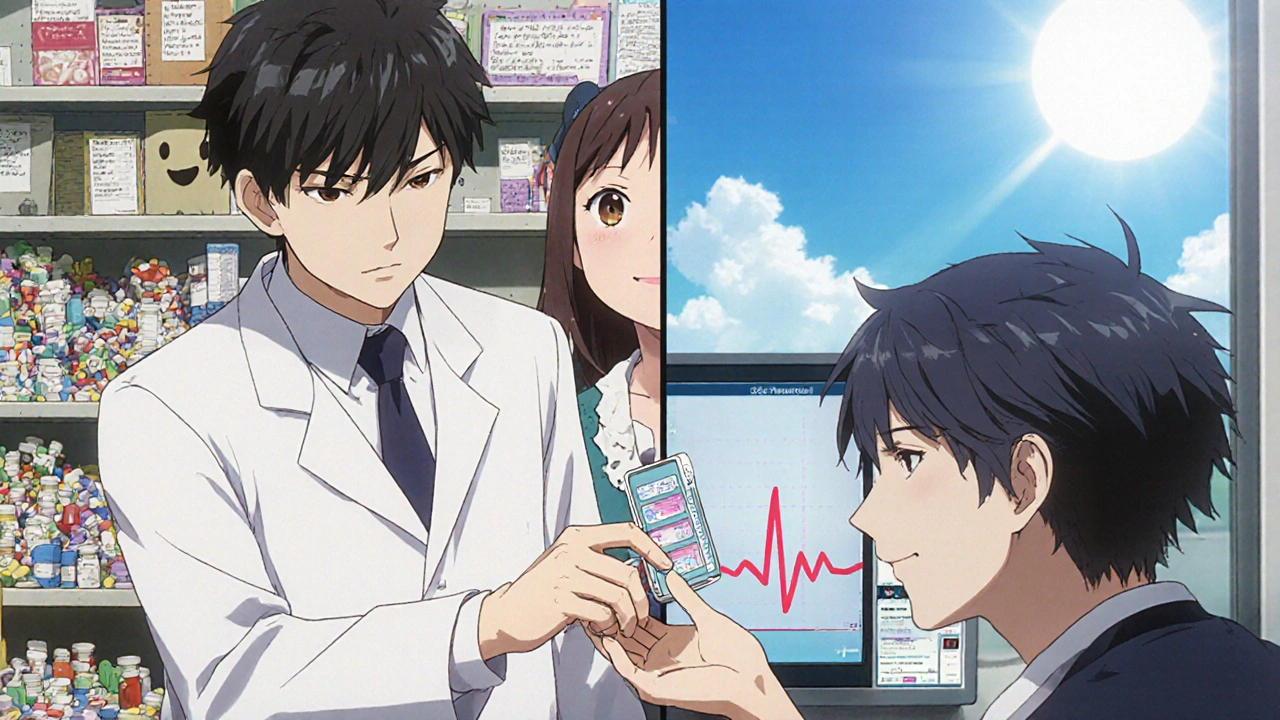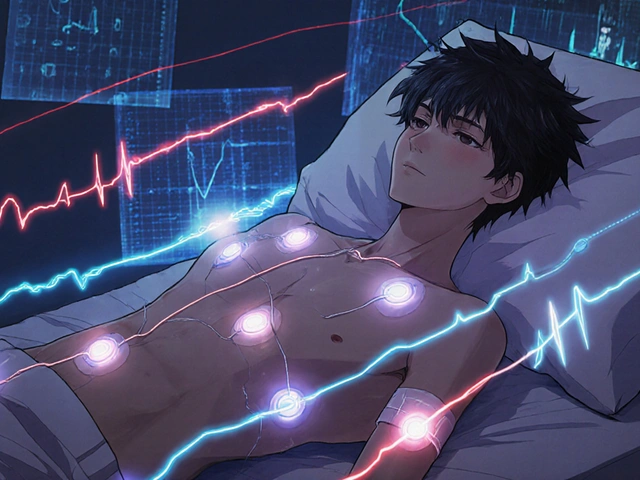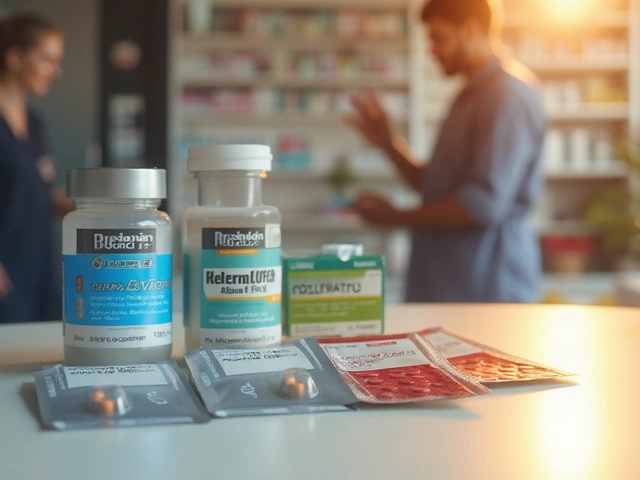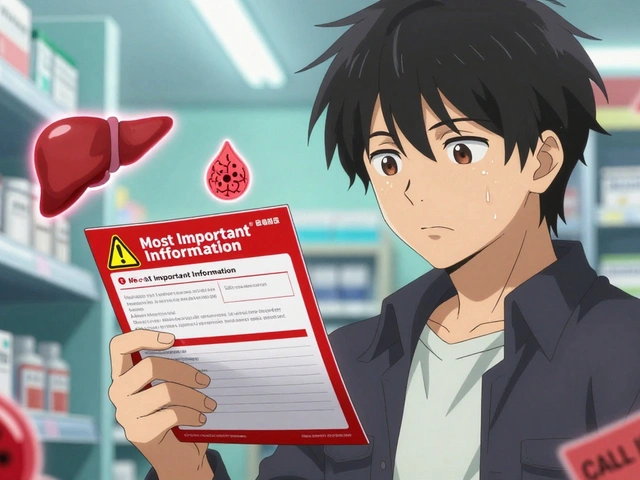
Why You Stop Taking Your Meds (Even When You Know You Shouldn’t)
You fill the prescription. You mean to take it. But then the dizziness hits. Or the nausea won’t quit. Or you’re told it might make you gain weight, feel numb, or sleep all day. So you skip a dose. Then another. Soon, you’re not taking it at all-even though you know it’s supposed to help.
This isn’t laziness. It’s not stubbornness. It’s human.
Half of all people taking long-term medications don’t take them as prescribed. That’s not a guess. That’s what the World Health Organization and U.S. Pharmacist both confirm for 2025. And side effects are the #1 reason why.
Think about it: if your blood pressure pill gives you a constant headache, or your antidepressant makes you feel like a zombie, why would you keep taking it? You’re not ignoring your health-you’re trying to protect your quality of life. The problem? Skipping meds often makes things worse.
The Real Cost of Skipping Pills
Not taking your meds doesn’t just mean your condition won’t improve. It can land you in the hospital-or worse.
In the U.S. alone, medication nonadherence causes about 125,000 preventable deaths every year. That’s more than traffic accidents. It also leads to up to 69% of medication-related hospital stays. And the cost? Billions. One study found that for every patient who sticks to their regimen, the system saves $1,200 a year.
But here’s the twist: most people who stop taking meds aren’t careless. They’re reacting to real, uncomfortable side effects. A study in Frontiers in Pharmacology found that after the first prescription, 18% to 34% of patients don’t even fill the second one-often because they felt worse after starting. And over time, up to 80% to 100% of people with chronic conditions eventually quit their meds, mostly because side effects piled up.
It’s not just about forgetting. It’s about fear. Fear of interactions. Fear of long-term damage. Fear that the cure is worse than the disease.
How Side Effects Kill Adherence-Step by Step
It doesn’t happen overnight. It’s a slow unraveling:
- Initiation failure: 4% to 31% of people never fill their first prescription. Often because they read the side effect list and panicked.
- Implementation failure: Of those who fill it, 18% to 34% don’t take it as directed. Maybe they skip doses when they feel okay. Maybe they cut the dose in half to avoid nausea.
- Persistence failure: After months, 80%+ of people with conditions like high blood pressure, diabetes, or depression stop taking their meds entirely. Side effects are the main driver.
And here’s the scary part: doctors and pharmacists often don’t know this is happening. A 2025 study in the British Journal of Clinical Pharmacology found pharmacists documented nonadherence only 52% of the time-far less than doctors or nurses. That means your fear, your discomfort, your reason for stopping? It’s not making it into your chart.

What Actually Works to Keep You on Track
There’s no magic pill for adherence. But there are proven ways to fix it-especially when side effects are the problem.
1. Talk to your pharmacist-not just your doctor. Pharmacists are trained to spot side effects and adjust regimens. A pharmacist-led program can boost adherence by up to 40%. They can suggest switching to a different brand, changing the time of day you take it, or adding something to ease nausea or dizziness.
2. Don’t suffer in silence. Report side effects like symptoms. If your statin gives you muscle pain, say so. If your blood pressure med makes you dizzy standing up, tell someone. Don’t wait for your next appointment. Call your pharmacy. Text your nurse line. Use your patient portal. There’s no such thing as a "silly" side effect.
3. Simplify the routine. If you’re taking 6 pills at 3 different times a day, no wonder you’re overwhelmed. Ask if you can switch to a combo pill. Or if your insulin can be taken once instead of twice. Fewer pills = fewer chances to mess up.
4. Use tools that actually help. A simple pill organizer? Great. A phone alarm? Helpful. But the best tools are the ones that connect you to real people. Apps that let you message your pharmacist when you feel off? Even better. Some programs now use AI to predict who’s at risk of quitting-and reach out before they drop off.
5. Get support, not judgment. The most successful interventions are face-to-face. One study showed 83% adherence with in-person pharmacist visits. Phone calls? Only 38%. You need someone to listen, not just remind you.
What Your Doctor Isn’t Telling You
Most doctors don’t have time to dig into side effects during a 10-minute visit. But here’s what they should tell you-and what you should ask for:
- "Which side effects are common? Which are dangerous?" Not all side effects are equal. Some are annoying. Some mean you need to stop immediately.
- "Is there a different medication with fewer side effects?" There often is. You don’t have to stick with the first one.
- "Can we start lower and go up slowly?" Many side effects fade as your body adjusts. Starting at half dose can make a huge difference.
- "What happens if I stop?" Be honest. If your blood pressure spikes without meds, your risk of stroke goes up. If you skip your antidepressant, your anxiety might come back harder. Know the stakes.
And if you’re on mental health meds? The stakes are even higher. One study found patients with depression were twice as likely to skip treatment-and that skipping mental health meds often meant they stopped taking all their meds, even for heart or diabetes.
When You’re Ready to Try Again
If you’ve stopped taking your meds and want to restart, you’re not failing. You’re human. And you’re not alone.
Start small. Don’t try to jump back into your old routine. Ask your pharmacist for a "re-entry plan." That might mean:
- Starting with half the dose for a week
- Switching to a different formulation (patch, liquid, extended-release)
- Adding a side effect buffer (like ginger for nausea, or taking meds with food)
- Setting up weekly check-ins with a pharmacist for the first month
And remember: adherence isn’t about perfection. It’s about progress. Taking 80% of your doses is often enough to get the benefit. You don’t need to be flawless-you just need to keep trying.

The Bigger Picture: Why This Matters Beyond You
Medication adherence isn’t just your personal problem. It’s a system-wide crisis.
Hospitals get penalized if too many patients with heart failure are readmitted. Insurance companies lose money when people end up in the ER because they skipped their pills. Medicare Star Ratings-the score that determines how much a plan gets paid-go up when patients take their meds as prescribed.
That’s why more pharmacies are now using data to flag people at risk. If you haven’t refilled your diabetes med in 60 days? They’ll call. If you’ve been filling blood pressure refills but not picking them up? They’ll send a text. This isn’t surveillance. It’s care.
And the future? It’s personal. AI will soon predict which side effects you’re most likely to have based on your genetics, your age, your other meds, even your sleep habits. Then it’ll suggest the right drug, the right dose, the right time-before you even start.
What to Do Right Now
Here’s your action list-simple, practical, and doable today:
- Look at your meds. Which one are you skipping? Why?
- Write down the side effect you’re worried about. Be specific: "I get dizzy every afternoon," not "I feel weird."
- Call your pharmacy. Ask: "Can we talk about my side effects? I want to keep taking my meds, but I need help."
- Ask for a pill organizer or a refill reminder system.
- If you’re on mental health meds, tell your pharmacist. They know how to help.
You don’t have to choose between feeling okay and staying healthy. There’s a middle ground. And someone-your pharmacist, your nurse, your doctor-can help you find it. You just have to speak up.
Medication Adherence Isn’t About Forgetting. It’s About Feeling Heard.
Side effects aren’t a bug in the system. They’re a signal. And when you’re ignored, you stop taking the medicine. That’s not noncompliance. That’s survival.
The solution isn’t more reminders. It’s more listening. More options. More compassion.
Stay on track not by fighting your body-but by working with your care team to make the treatment fit your life.
Write a comment
Your email address will not be published.





14 Comments
I used to skip my blood pressure meds because I felt like a zombie. Then I switched to taking them at night and it changed everything. No more dizziness during the day. Just a quiet, normal life. You don't have to suffer. There's always a tweak.
My grandma took 7 pills a day. She stopped for 3 months because she was scared of kidney damage. Turned out she just needed a different brand. Pharmacist found it in 10 minutes. She’s alive today because someone listened.
I stopped my antidepressants because I gained 15 pounds. Felt like a traitor to myself. But when I went back to my pharmacist and said 'I need help not judgment'-she switched me to one that didn't mess with my appetite. I'm still on it. 2 years now.
In India, we think if you feel better, you can stop. Big mistake. My uncle stopped his diabetes meds after 3 months because his sugar was 'normal'. Ended up in the hospital with a foot infection. Don't be like him. Talk to your pharmacist. They know more than you think.
The notion that patients are 'noncompliant' is a systemic failure disguised as individual negligence. The medical industrial complex has created a dependency on pharmaceuticals without investing in patient-centered care infrastructure. This is not about willpower; it is about institutional abandonment.
People who skip meds are just lazy. If you can’t handle a little nausea, maybe you shouldn’t be on meds. My grandfather took chemo with vomiting and still walked 5 miles a day. You want to live? Stop whining.
This is so real. I was the guy who skipped my statin because I thought the muscle pain was 'just aging'. Turned out it was rhabdomyolysis. Spent a week in ICU. Now I talk to my pharmacist every time I feel off. No shame. No guilt. Just communication. That’s the game changer.
Americans think they can just switch pills like swapping phones. In India we dont have this luxury. We take what we get. No choice. No pharmacist talk. Just pray. Your system is weak. You have too many options. That's why you fail.
I used to be the guy who said 'I'll just skip it when I feel fine'... until I had a stroke at 41. Now I take every pill. Every. Single. One. Even if I feel great. Because I know what happens when you think you're fine. Spoiler: you're not. And your family pays the price.
I have been taking my meds for 12 years. I have a pill box. I have alarms. I have a journal. I have a therapist. I have a pharmacist I text at 2 a.m. when I feel weird. I have a support group. I have a pet dog who licks my face when I forget. I still miss doses sometimes. But I keep trying. And that’s enough.
The entire paradigm of pharmaceutical adherence is predicated upon an antiquated biomedical model that fundamentally misunderstands the phenomenological experience of chronic illness. One cannot reduce human subjectivity to a compliance metric. The very notion of 'adherence' is a colonial construct imposed upon embodied vulnerability.
I stopped my meds because my doctor didn't care. I told him I was dizzy. He said 'it's normal'. I told him I couldn't sleep. He said 'try melatonin'. I stopped. Two months later I had a heart attack. Now I go to a different doctor. And I bring a list. And I don't let him rush me. You have to fight for your life.
I just started my meds again after 6 months off. Took half dose for a week. Took them with food. Got a pill case. Talked to my pharmacist every Monday. I’m not perfect. But I’m trying. And that’s better than giving up.
The pharmacoeconomic data on nonadherence is compelling, but the qualitative literature reveals a profound epistemic injustice wherein patient-reported adverse effects are systematically devalued within clinical hierarchies. This necessitates a paradigmatic shift toward patient-centered pharmacovigilance frameworks.